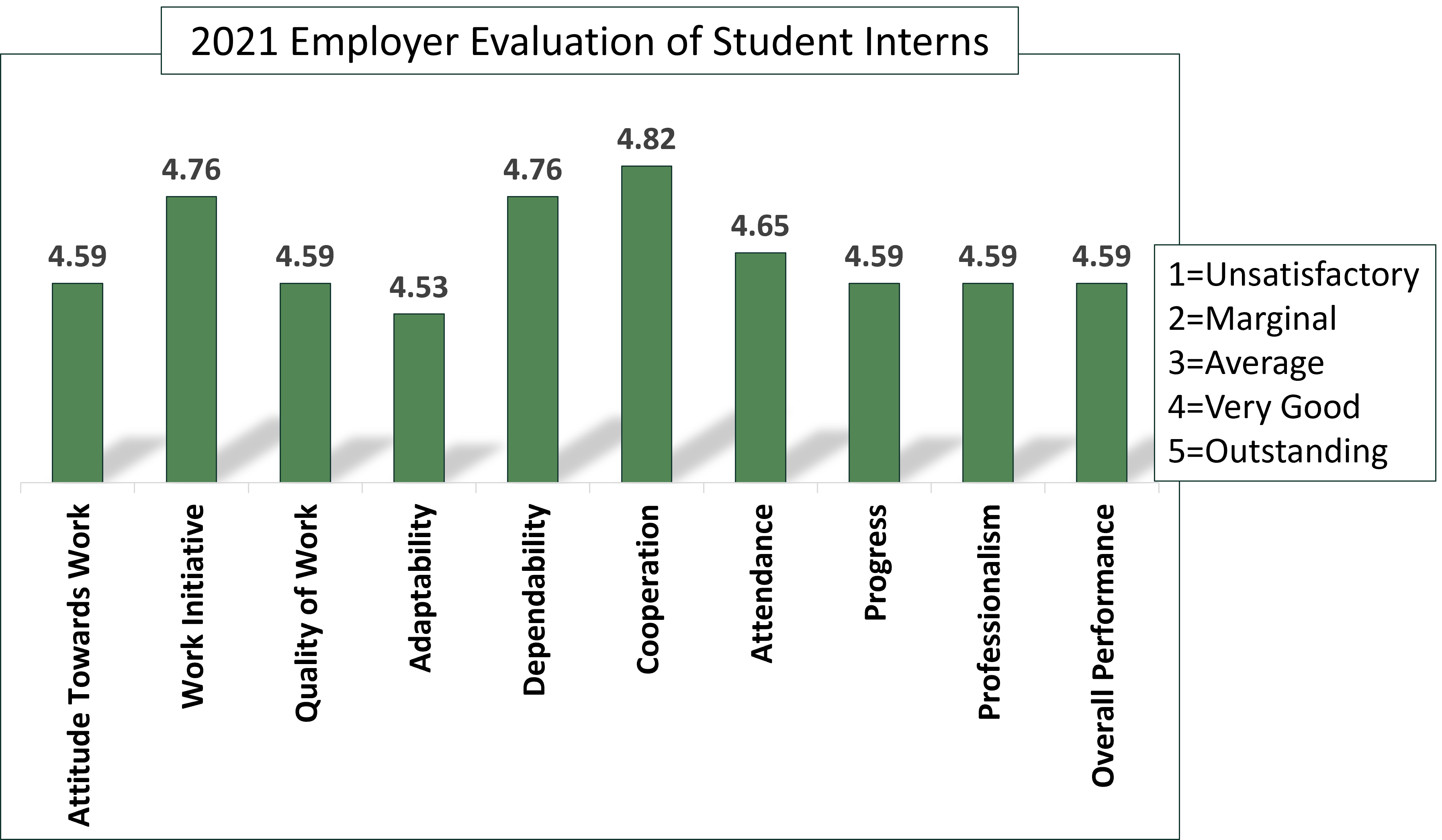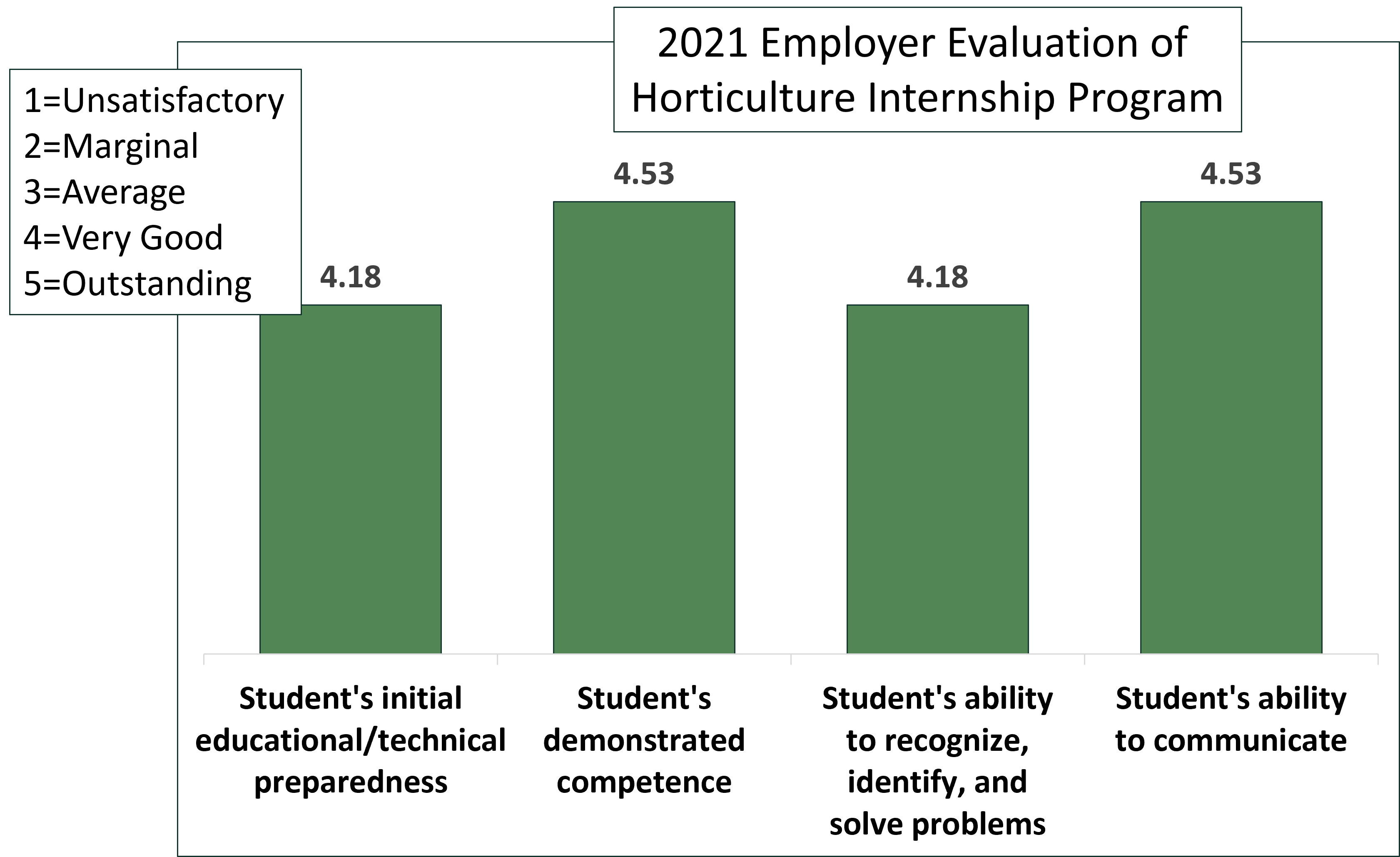2021-2022 Assessment Data
Student Learning Outcome Assessment Data
2021-2022 Learning Outcomes Assessment Results – Department of Horticulture, Undergraduate Courses (HRT)
|
Learning Outcome
|
Class Evaluated | Assessment Results* |
|
1. Apply concepts of horticulture science to select, manage, and improve plants and their products
|
HRT 203 |
68.4 |
|
2. Demonstrate competence with laboratory and/or field-based technologies used in modern horticulture
|
HRT 203 |
81.6 |
|
3. Anticipate and recognize problems, identify causes of these problems, quantify potential impacts, analyze options, identify viable solutions, and evaluate actions and consequences of treatments and interventions
|
HRT 203 |
71.1 |
|
4. Describe social, spiritual, and cultural importance of plants to historical and contemporary communities of people
|
HRT 203 |
94.7 |
|
5. Use multiple sources, including current and older literature, to find, evaluate, organize, and manage information related to horticultural systems
|
HRT 203 |
94.7 |
|
6. Identifies and applies, as appropriate, quantitative methods for defining and responding to horticultural problems.
|
HRT 203 |
63.2
|
|
7. Understand how global issues including climate change, energy use, water availability, and/or food safety impact sustainability of horticultural systems locally, nationally, and globally
|
HRT 203 |
84.2 |
|
8. Apply principles of accounting, business law, labor, marketing, and personnel management to a horticultural business and contribute to developing various components of a business plan
|
HRT 404 |
93.3 |
|
9. Demonstrate professionalism and proficiency in skills that relate to horticulture through leadership and the ability to collaborate and work in teams
|
HRT 207 |
86.4 |
|
10. Develop thoughtful, clear, and consistent perspectives on ethical and moral issues related to horticulture
|
HRT 404 |
66.7 |
|
11. Communicate effectively with various audiences using oral, written, and visual presentation skills, and contemporary networking/social media technologies
|
HRT 203 |
94.7 |
|
12. Quantify economic importance of plants in managed ecosystems and the impact of horticultural crops in food systems
|
HRT 404 |
100 |
*Percent value indicates the percentage of students who received 75% or better on a given assessment. Our goal is that 80% of our students will receive a grade of 75% or better
2021 Employer Evaluation of Student Interns
Of the 25 BS Horticulture students participating in internships during the Summer 2021 semester, 17 employers responded to our voluntary survey. The first set of questions evaluated the individual student’s performance on the job and questions were asked on a Likert 5-point scale (where 1=unsatisfactory and 5=outstanding; Figure 1). Average student scores for the ten metrics were all above a score of 4 (‘Very Good’ or better), indicating our students have a positive attitude towards work, exhibit excellent work initiative and professionalism, produce high quality work, are adaptable, dependable and cooperative. The median of all scores was 5.0 (data not shown).

Figure 1. 2021 Indirect Measurements of Student Learning Outcomes: Average Employer Evaluation Scores of Student Interns (n=17).
The second set of questions asked student supervisors to evaluate MSU’s horticulture program as it pertains to preparing students to work in the industry and questions were asked on a Likert 5-point scale (where 1=unsatisfactory and 5=outstanding; Figure 2). Average program scores for the four metrics were all above a score of 4 (‘Very Good’) or better, indicating our students are prepared for industry work, have demonstrated competence with lab/field-based technologies, are able to anticipate, recognize, and solve problems, and are able to communicate effectively in the work environment (medians of 4.0, 5.0, 4.0, and 5.0, respectively; data not shown).

Figure 2. 2021 Indirect Measurements of Student Learning Outcomes: Average Employer Evaluation Scores of MSU’s Horticulture Program (n=17).
Our program learning outcome goals for this employer survey are that 80% of our students will receive a 4 or better on a Likert scale of 1 (lowest score) to 5 (highest score). This goal was met for all five LOs measured (Table 1).
Table 1. Learning Outcome Results of Employer Survey
|
Learning Outcome |
% of students who received a 4+ on a scale of 1 (low) to 5 (best)* |
|
|
2 |
Anticipate and recognize problems, identify causes of these problems, quantify potential impacts, analyze options, identify viable solutions, and evaluate actions and consequences of treatments and interventions |
94.1 |
|
3 |
Describe social, spiritual, and cultural importance of plants to historical and contemporary communities of people |
100 |
|
9 |
Develop thoughtful, clear, and consistent perspectives on ethical and moral issues related to horticulture |
94.1 |
|
10 |
Communicate effectively with various audiences using oral, written, and visual presentation skills, and contemporary networking/social media technologies |
94.1 |
|
11 |
Quantify economic importance of plants in managed ecosystems and the impact of horticultural crops in food systems |
100 |
The goal is to have at least 80% of students receive a 4+. n=17.
May 2022 Graduating Seniors Survey: Self-Reported Results
The annual student survey data was administered in April and May 2022. Results of the student self-reported assessment results are shown below, where the goal is for 80% of our students to report 4+ on a scale of 1 (strong disagree) to 5 (strongly agree). This question was only asked to those students who indicated they were graduating in Spring or Summer 2022 (n=13).
Rate your agreement to the following statement*
|
My horticulture degree educated/trained me to....
|
Average Score* |
|
1. Apply concepts of horticulture science to select, manage, and improve plants and their products
|
4.5 |
|
2. Demonstrate competence with laboratory and/or field-based technologies used in modern horticulture
|
4.1 |
|
3. Anticipate and recognize problems, identify causes of these problems, quantify potential impacts, analyze options, identify viable solutions, and evaluate actions and consequences of treatments and interventions
|
4.3 |
|
4. Describe social, spiritual, and cultural importance of plants to historical and contemporary communities of people
|
4.6 |
|
5. Use multiple sources, including current and older literature, to find, evaluate, organize, and manage information related to horticultural systems
|
4.7 |
|
6. Identifies and applies, as appropriate, quantitative methods for defining and responding to horticultural problems.
|
4.3 |
|
7. Understand how global issues including climate change, energy use, water availability, and/or food safety impact sustainability of horticultural systems locally, nationally, and globally
|
4.3 |
|
8. Apply principles of accounting, business law, labor, marketing, and personnel management to a horticultural business and contribute to developing various components of a business plan
|
4.2 |
|
9. Demonstrate professionalism and proficiency in skills that relate to horticulture through leadership and the ability to collaborate and work in teams
|
4.1 |
|
10. Develop thoughtful, clear, and consistent perspectives on ethical and moral issues related to horticulture
|
4.2 |
|
11. Communicate effectively with various audiences using oral, written, and visual presentation skills, and contemporary networking/social media technologies
|
4.2 |
|
12. Quantify economic importance of plants in managed ecosystems and the impact of horticultural crops in food systems
|
4.3 |
*Scale 1 to 5, 5=strongly agree.



 Print
Print Email
Email